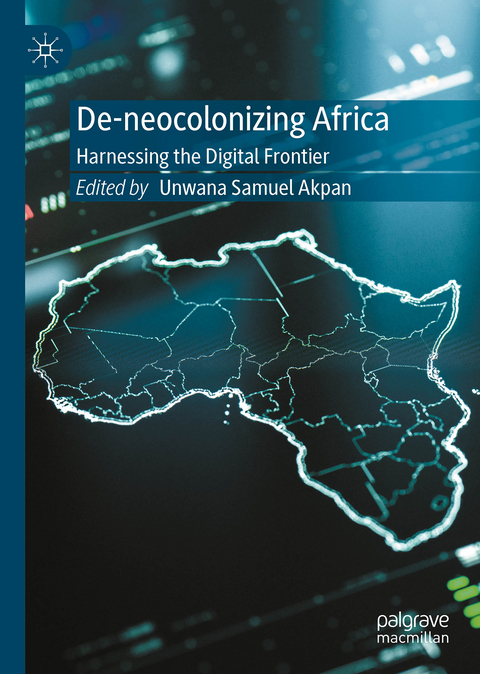
De-neocolonizing Africa
Springer International Publishing (Verlag)
978-3-031-66303-1 (ISBN)
Dr. Unwana Samuel Akpan is a media scholar-practitioner with over two decades of broadcast experience. He has been a visiting scholar at the Department of Communication, Culture and Media Studies (CCMS), where he completed his postdoctoral studies in the School of Communication and Media Studies, Howard University, Washington DC, USA. He is the editor of the University of Lagos Communication Review and presently a lecturer in the Department of Mass Communication, University of Lagos, Akoka.
Chapter 1. Comparative Analysis of Kunta Kinte in "Roots" and Okonkwo in "Things Fall Apart" as Symbols of Colonial and Neocolonial Defiants: Legacy of Resistance and Resilience against the White Man's Kraal
Chapter 2. Advancing African Communication Scholarship: The African Culture-Oriented Framework for Mentoring
Chapter 3. Bending the Spoon with Our Minds: Africa's Apocalyptic Fate with Coloniality
Chapter 4. Ideology The Colonialism that Evades Decolonization
Chapter 5. De-Neocolonizing and Redesigning African Education for Success in the Digital Age
Chapter 6. De-Neocolonizing Africa via Trade and Commerce Route in the Digital Age
Chapter 7. De-Neocolonizing Development Concept: Communication Policy-Making and Sustainable Development in Africa
Chapter 8. Customer Engagement Marketing: One of the New Advertising Trends
Chapter 10. The Unmasking of Digital Media Juju in Africa
Chapter 11. Digitally De-Neocolonizing the Nigerian Journalism Space
Chapter 12. Mega Sports Events Coloniality of Power and the FIFA 2010 World Cup in South Africa - An Analysis of the Changes in Representation over the Past Ten Years
Chapter 13. Ways Forward for Media Development: Towards a De-Neocolonization Project
Chapter 14. Afro-Digital Sustainability and Mass Media in Nigeria
Chapter 15. Beyond the Neocolonizer's Appreciation of Climate Change Consumption of Zimbabwean Tabloid Umthunywa
Chapter 16. Neocolonial Framing of Developing and Developed Countries' Attitudes Towards COVID-19 in the Guardian and Al-Jazeera Newspapers
Chapter 17. The Role of the African Diaspora in Contributing Towards and Investing in Public Services Governance in Africa: An Ethical Perspectives
Chapter 18. Decolonial Constructions and Negotiations of Ethnic and Transnational Identities The Case of Young Igbo Adults
Chapter 19. Deconstructing Colonial Frameworks in the Black Panther Film Analysis
Chapter 20. Depicting Neocolonialism in Screenplay Exploring Social Prescribing vis a vis Dominance in Femi Adebayo's Jagun Jagun
Chapter 21. Nigerian Language Media Use and Entertainment Industry as Panacea for Decolonizing Recolonized Space
Chapter 22. De-Neocolonizing the South African Music Education Selective Transformation
Chapter 23. A Clarion Call to De-Westernize the Music Curricula of the Namibian Tertiary Institutions
Chapter 24. Espousal of Home-Grown Production Techniques for Zimbabwean Indigenous Music in the Digitized Age
Chapter 25. Ngoma Materiality and Instrumentality Reconfiguring Malawian Indigenous Music Digitization for Global Music Appreciation
Chapter 26. Exploring Globalization and Digitization Strategies to Counter Westernization and Neocolonialism in Botswana's Music Industry.
| Erscheinungsdatum | 17.10.2024 |
|---|---|
| Verlagsort | Cham |
| Sprache | englisch |
| Maße | 148 x 210 mm |
| Themenwelt | Sozialwissenschaften ► Kommunikation / Medien ► Medienwissenschaft |
| Schlagworte | Africa • Colonization • Decolonization • De-neocolonization • De-westernization • Digital capabilities • Digital technology • domestication • Neo-colonization |
| ISBN-10 | 3-031-66303-9 / 3031663039 |
| ISBN-13 | 978-3-031-66303-1 / 9783031663031 |
| Zustand | Neuware |
| Informationen gemäß Produktsicherheitsverordnung (GPSR) | |
| Haben Sie eine Frage zum Produkt? |
aus dem Bereich


